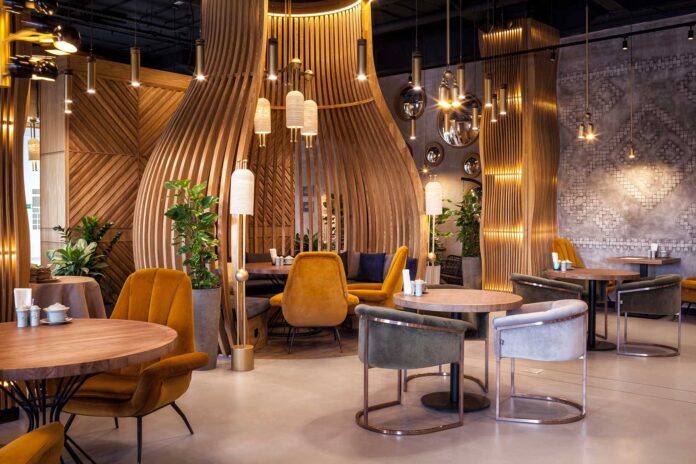Embark on a journey of culinary delight as we explore an array of restaurant furniture styles, each contributing to unforgettable dining experiences. From modern marvels to traditional elegance, industrial chic, and timeless charm, discover the art of crafting ambiance that resonates with diverse tastes, creating memorable moments for patrons
Introduction
In the world of dining, the atmosphere is as important as the flavors served. Restaurant furniture plays a pivotal role in shaping the ambiance, offering a unique canvas for restaurateurs to express their vision. This exploration delves into four distinct restaurant furniture styles, each contributing to the overall dining experience. As we embark on this journey, we’ll unravel the characteristics that make each style stand out, from the contemporary allure of modern marvels to the timeless charm of antique inspirations.
In the dining world, how a place feels is just as crucial as the food it serves. Restaurant furniture acts as a key player in setting the vibe, giving restaurateurs a canvas to showcase their vision. In this exploration, we’ll dive into four different furniture styles, each shaping the dining experience uniquely. Join us as we uncover what makes each style special, from the modern appeal of today to the enduring charm of days gone by.
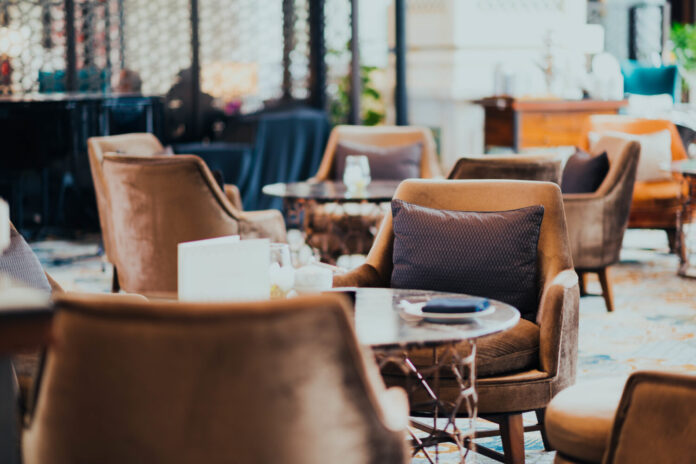
Modern Marvels: Contemporary Elegance Unveiled
Modern-style restaurants are a celebration of contemporary design, characterized by sharp angles, clean lines, and the use of sleek materials such as suede, leather, and vinyl. The ambiance is airy and dynamic, with molded components contributing to a sense of modernity. Ideal for fast-casual eateries and coffee shops, this style blends bright, striking colors with a minimalist aesthetic, creating an inviting space that resonates with the vibrancy of today’s dining scene.
Modern-style restaurants serve as a vibrant celebration of contemporary design, marked by sharp angles, clean lines, and the infusion of sleek materials like suede, leather, and vinyl. The overall ambiance is characterized by an airy and dynamic quality, with molded components adding a touch of modernity. Tailored for fast-casual eateries and coffee shops, this style expertly blends bright, striking colors with a minimalist aesthetic, crafting an inviting space that harmoniously resonates with the energetic vibrancy of today’s dynamic dining scene.
Bright, striking colors punctuate the minimalist aesthetic, infusing the space with energy and vibrancy. The result is an inviting and dynamic environment that resonates with the pulse of today’s dining scene. In these modern-style restaurants, every detail is intentional, creating an atmosphere that not only reflects contemporary design principles but also invites patrons to become active participants in the unfolding narrative of culinary exploration.
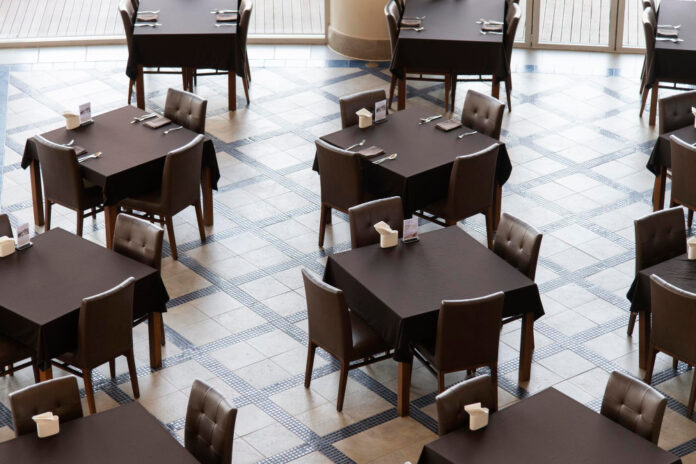
Traditional Elegance: A Symphony of Classic Touches
In contrast, traditional-style restaurants embrace classic elegance with elements like python textures, black jackets, and antique chandeliers. Luxurious materials like velvet, leather, and dark-toned wood contribute to an atmosphere of sophistication and comfort. This style finds its perfect home in upscale dining establishments and intimate family gatherings, offering a timeless and refined dining experience.
In the realm of traditional-style restaurants, classic elegance takes center stage with captivating elements like python textures, black jackets, and antique chandeliers. The opulence of luxurious materials, including velvet, leather, and dark-toned wood, contributes to an ambiance that effortlessly marries sophistication with comfort. Tailored for upscale dining establishments and intimate family gatherings, this style creates a timeless and refined dining experience. Patrons find themselves immersed in an atmosphere where every detail echoes a sense of enduring grace, inviting them to savor moments of culinary delight in a setting that transcends the boundaries of time.
This style finds its natural habitat in upscale dining establishments, where the marriage of classic aesthetics and sumptuous materials sets the stage for a dining experience steeped in sophistication. Beyond formal settings, the charm of traditional-style restaurants effortlessly extends its embrace to intimate family gatherings. Within these walls, every meal becomes an opportunity to savor the elegance of a bygone era, creating a timeless and refined dining experience that lingers in the hearts of patrons.
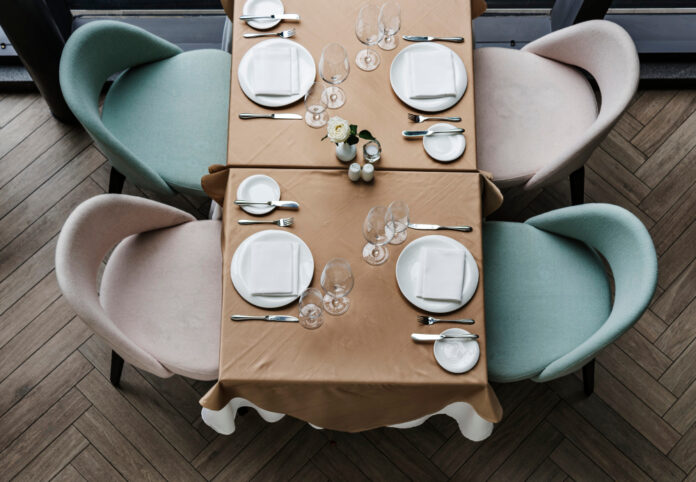
Industrial Chic: Trendy Affordability
The industrial design evokes the ambiance of factories and workplaces, providing a cost-effective yet trendy solution. Using materials like aluminum, wood, steel, and metal, industrial-style restaurants feature stackable seats and metal cafe tables. Ideal for fast-food joints, casual eateries, and canteens, this style creates an open and welcoming atmosphere. Despite heavy traffic, the affordability of industrial furniture design makes it an excellent choice for those looking to save on costs while maintaining a trendy aesthetic.
Despite the inevitable hustle and bustle associated with heavy foot traffic, the affordability of industrial furniture design stands out as a distinguishing feature. It becomes a strategic choice for those seeking to balance budget constraints without compromising on the overall aesthetic appeal. In these industrial-style restaurants, patrons are welcomed into an open and inviting atmosphere that seamlessly blends affordability with trendiness, creating an experience that resonates with the pulse of contemporary dining preferences.
In the dynamic landscape of industrial-style restaurants, where heavy foot traffic is a constant, the affordability of industrial furniture design emerges as a beacon of practicality. A strategic choice for those navigating budget constraints, it doesn’t sacrifice the overarching aesthetic appeal. Within these vibrant spaces, patrons step into an inviting atmosphere, an ode to open design that effortlessly fuses budget-conscious choices with the latest trends. This seamless blend creates an experience perfectly attuned to the contemporary dining preferences, offering affordability without compromising on the essence of trendiness.
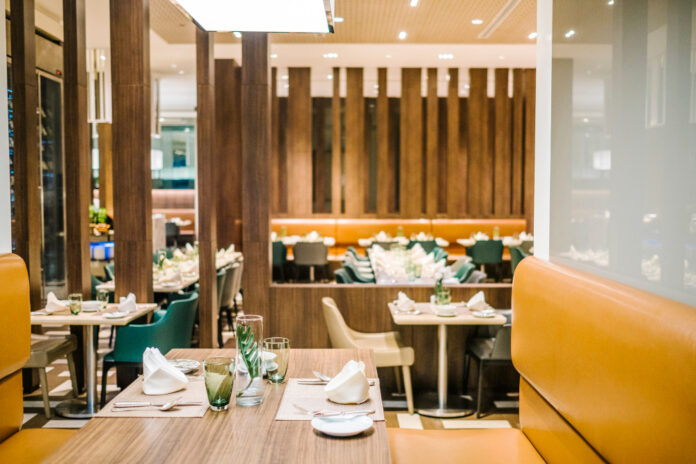
Timeless Charm: Antique Inspirations
Antique-style restaurants transport patrons to a bygone era, offering a rustic and charming atmosphere. With elements like rustic tables, antique dining chairs, and organic materials such as glass, bamboo, and stone, this style emanates calm and humility. The use of pastel color schemes and weathered wood adds a nostalgic touch, making it suitable for cafés, canteens, and tea shops. The combination of old-world charm with modern elements creates a unique and memorable dining experience.
What sets antique-style restaurants apart is the delicate dance between old-world charm and modern sensibilities. The integration of classic elements with contemporary touches results in an ambiance that is both unique and memorable. Patrons are invited to savor not just a meal, but a rich tapestry of history and charm, creating a dining experience that lingers in the heart long after the last bite.
In the realm of antique-style restaurants, it’s the delicate interplay between old-world charm and modern sensibilities that sets them apart. This harmonious fusion of classic elements with contemporary touches creates an ambiance that is both distinctive and unforgettable. Patrons are not merely indulging in a meal; they’re immersing themselves in a rich tapestry of history and charm. Such an experience lingers in the heart, weaving memories that endure long after the last delightful bite.
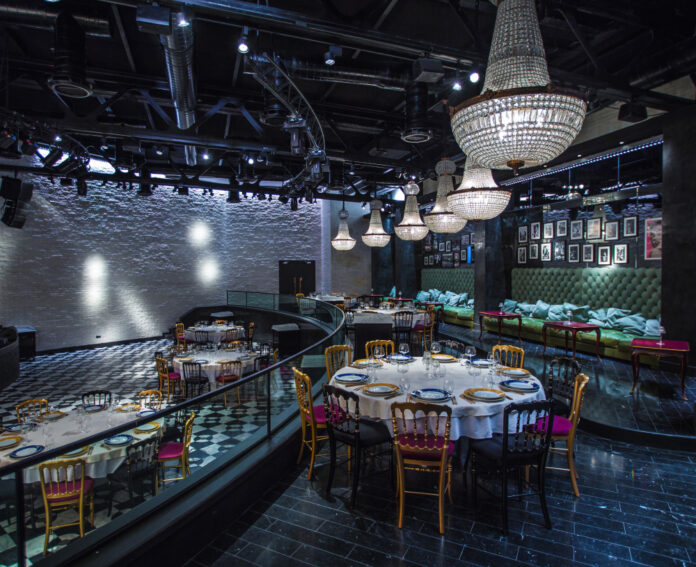
Conclusion
As restaurateurs continue to innovate and express their culinary visions, the choice of restaurant furniture styles becomes a critical aspect of creating an unforgettable dining experience. Whether patrons find themselves immersed in the contemporary allure of modern marvels, the classic elegance of traditional establishments, the trendy affordability of industrial chic, or the timeless charm of antique inspirations, each style contributes uniquely to the rich tapestry of the dining journey. The interplay of design choices and furnishings becomes a silent yet powerful storyteller, leaving an indelible impression on those who dine within its embrace.

